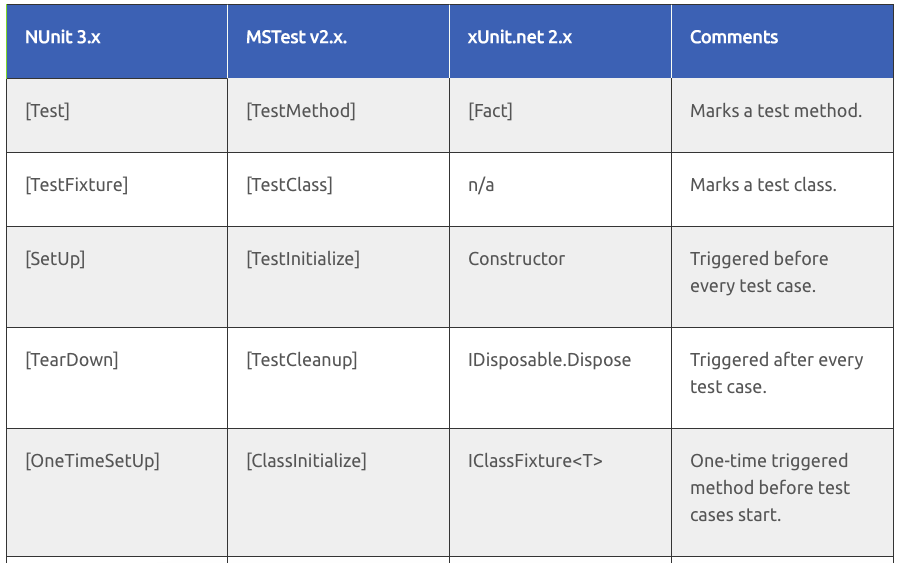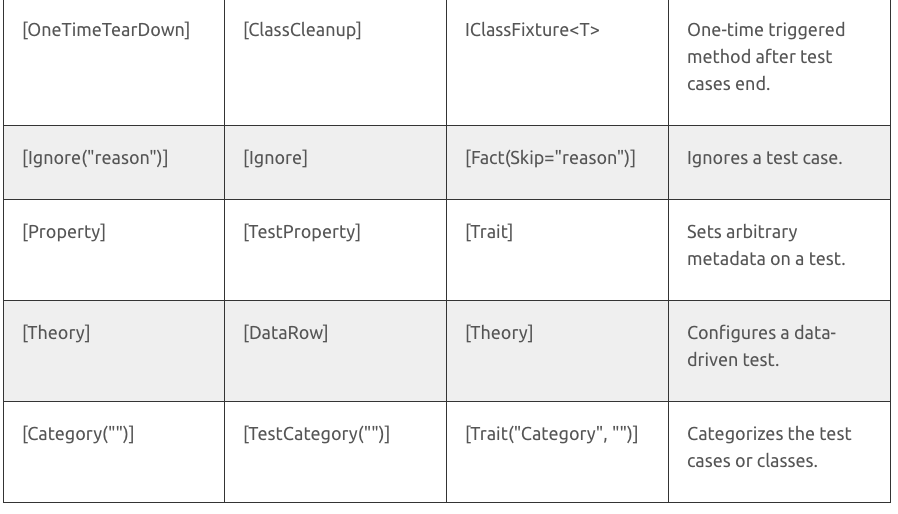Most Complete NUnit Unit Testing Framework Cheat Sheet
This ''cheat sheet'' will help you get started with NUnit for unit testing .NET applications by getting familiar with its syntax.
Join the DZone community and get the full member experience.
Join For FreeAn essential part of every UI test framework is the use of a unit testing framework. One of the most popular ones in the .NET world is NUnit. However, you cannot find a single place where you can get started with its syntax. So, I decided that it would be great to create a complete cheat sheet. I hope that you will find it useful. Enjoy!
Installation
Install-Package NUnit
Install-Package NUnit.TestAdapter
Install-Package Microsoft.NET.Test.SdkTo discover or execute test cases, VSTest would call the test adapters based on your project configuration. (That is why NUnit/xUnit/MSTest all ask you to install a test adapter NuGet package to your unit testing projects). So NUnit.TestAdapter exists for that purposes.
NUnit itself implements the testing frameworks and its contracts. So you need to add a NuGet reference to it to write unit test cases and have them compiled. Only compiled projects along with the test adapter can then be consumed by Visual Studio.
Test Execution Workflow
using NUnit.Framework;
namespace NUnitUnitTests
{
// A class that contains NUnit unit tests. (Required)
[TestFixture]
public class NonBellatrixTests
{
[OneTimeSetUp]
public void ClassInit()
{
// Executes once for the test class. (Optional)
}
[SetUp]
public void TestInit()
{
// Runs before each test. (Optional)
}
[Test]
public void TestMethod()
{
}
[TearDown]
public void TestCleanup()
{
// Runs after each test. (Optional)
}
[OneTimeTearDown]
public void ClassCleanup()
{
// Runs once after all tests in this class are executed. (Optional)
// Not guaranteed that it executes instantly after all tests from the class.
}
}
}
// A SetUpFixture outside of any namespace provides SetUp and TearDown for the entire assembly.
[SetUpFixture]
public class MySetUpClass
{
[OneTimeSetUp]
public void RunBeforeAnyTests()
{
// Executes once before the test run. (Optional)
}
[OneTimeTearDown]
public void RunAfterAnyTests()
{
// Executes once after the test run. (Optional)
}
}OneTimeSetUp from SetUpFixture (once per assembly)
OneTimeSetUp from TestFixture (once per test class class)
SetUp (before each test of the class)
Test1
TearDown (after each test of the class)
SetUp
Test2
TearDown
...
OneTimeTearDown from TestFixture (once per test class)
OneTimeSetUp from TestFixture
...
OneTimeTearDown from TestFixture
OneTimeTearDown from SetUpFixture (once per assembly)
Attributes Comparison
Comparing NUnit to other frameworks.


Assertions
Assertions — Classic Model
The classic Assert model uses a separate method to express each individual assertion of which it is capable.
Assert.AreEqual(28, _actualFuel); // Tests whether the specified values are equal.
Assert.AreNotEqual(28, _actualFuel); // Tests whether the specified values are unequal. Same as AreEqual for numeric values.
Assert.AreSame(_expectedRocket, _actualRocket); // Tests whether the specified objects both refer to the same object
Assert.AreNotSame(_expectedRocket, _actualRocket); // Tests whether the specified objects refer to different objects
Assert.IsTrue(_isThereEnoughFuel); // Tests whether the specified condition is true
Assert.IsFalse(_isThereEnoughFuel); // Tests whether the specified condition is false
Assert.IsNull(_actualRocket); // Tests whether the specified object is null
Assert.IsNotNull(_actualRocket); // Tests whether the specified object is non-null
Assert.IsInstanceOf(_actualRocket, typeof(Falcon9Rocket)); // Tests whether the specified object is an instance of the expected type
Assert.IsNotInstanceOf(_actualRocket, typeof(Falcon9Rocket)); // Tests whether the specified object is not an instance of type
StringAssert.AreEqualIgnoringCase(_expectedBellatrixTitle, "Bellatrix"); // Tests whether the specified strings are equal ignoring their casing
StringAssert.Contains(_expectedBellatrixTitle, "Bellatrix"); // Tests whether the specified string contains the specified substring
StringAssert.DoesNotContain(_expectedBellatrixTitle, "Bellatrix"); // Tests whether the specified string doesn't contain the specified substring
StringAssert.StartsWith(_expectedBellatrixTitle, "Bellatrix"); // Tests whether the specified string begins with the specified substring
StringAssert.StartsWith(_expectedBellatrixTitle, "Bellatrix"); // Tests whether the specified string begins with the specified substring
StringAssert.IsMatch("(281)388-0388", @"(?d{3})?-? *d{3}-? *-?d{4}"); // Tests whether the specified string matches a regular expression
StringAssert.DoesNotMatch("281)388-0388", @"(?d{3})?-? *d{3}-? *-?d{4}"); // Tests whether the specified string does not match a regular expression
CollectionAssert.AreEqual(_expectedRockets, _actualRockets); // Tests whether the specified collections have the same elements in the same order and quantity.
CollectionAssert.AreNotEqual(_expectedRockets, _actualRockets); // Tests whether the specified collections does not have the same elements or the elements are in a different order and quantity.
CollectionAssert.AreEquivalent(_expectedRockets, _actualRockets); // Tests whether two collections contain the same elements.
CollectionAssert.AreNotEquivalent(_expectedRockets, _actualRockets); // Tests whether two collections contain different elements.
CollectionAssert.AllItemsAreInstancesOfType(_expectedRockets, _actualRockets); // Tests whether all elements in the specified collection are instances of the expected type
CollectionAssert.AllItemsAreNotNull(_expectedRockets); // Tests whether all items in the specified collection are non-null
CollectionAssert.AllItemsAreUnique(_expectedRockets); // Tests whether all items in the specified collection are unique
CollectionAssert.Contains(_actualRockets, falcon9); // Tests whether the specified collection contains the specified element
CollectionAssert.DoesNotContain(_actualRockets, falcon9); // Tests whether the specified collection does not contain the specified element
CollectionAssert.IsSubsetOf(_expectedRockets, _actualRockets); // Tests whether one collection is a subset of another collection
CollectionAssert.IsNotSubsetOf(_expectedRockets, _actualRockets); // Tests whether one collection is not a subset of another collection
Assert.Throws<ArgumentNullException>(() => new Regex(null)); // Tests whether the code specified by delegate throws exact given exception of type TAssertions — Constraint Model
The constraint-based Assert model uses a single method of the Assert class for all assertions. The logic necessary to carry out each assertion is embedded in the constraint object passed as the second parameter to that method. The second argument in this assertion uses one of NUnit's syntax helpers to create an EqualConstraint.
Assert.That(28, Is.EqualTo(_actualFuel)); // Tests whether the specified values are equal.
Assert.That(28, Is.Not.EqualTo(_actualFuel)); // Tests whether the specified values are unequal. Same as AreEqual for numeric values.
Assert.That(_expectedRocket, Is.SameAs(_actualRocket)); // Tests whether the specified objects both refer to the same object
Assert.That(_expectedRocket, Is.Not.SameAs(_actualRocket)); // Tests whether the specified objects refer to different objects
Assert.That(_isThereEnoughFuel, Is.True); // Tests whether the specified condition is true
Assert.That(_isThereEnoughFuel, Is.False); // Tests whether the specified condition is false
Assert.That(_actualRocket, Is.Null); // Tests whether the specified object is null
Assert.That(_actualRocket, Is.Not.Null); // Tests whether the specified object is non-null
Assert.That(_actualRocket, Is.InstanceOf<Falcon9Rocket>()); // Tests whether the specified object is an instance of the expected type
Assert.That(_actualRocket, Is.Not.InstanceOf<Falcon9Rocket>()); // Tests whether the specified object is not an instance of type
Assert.That(_actualFuel, Is.GreaterThan(20)); // Tests whether the specified object greater than the specified valueAdvanced Attributes
Author Attribute
The Author Attribute adds information about the author of the tests. It can be applied to test fixtures and to tests.
[TestFixture]
[Author("Joro Doev", "joro.doev@bellatrix.solutions")]
public class RocketFuelTests
{
[Test]
public void RocketFuelMeassuredCorrectly_When_Landing() { /* ... */ }
[Test]
[Author("Ivan Penchev")]
public void RocketFuelMeassuredCorrectly_When_Flying() { /* ... */ }
}Repeat Attribute
RepeatAttribute is used on a test method to specify that it should be executed multiple times. If any repetition fails, the remaining ones are not run and a failure is reported.
[Test]
[Repeat(10)]
public void RocketFuelMeassuredCorrectly_When_Flying() { /* ... */ }Combinatorial Attribute
The CombinatorialAttribute is used on a test to specify that NUnit should generate test cases for all possible combinations of the individual data items provided for the parameters of a test.
[Test, Combinatorial]
public void CorrectFuelMeassured_When_X_Site([Values(1,2,3)] int x, [Values("A","B")] string s)
{
...
}Generated tests:
CorrectFuelMeassured_When_X_Site(1, "A")
CorrectFuelMeassured_When_X_Site(1, "B")
CorrectFuelMeassured_When_X_Site(2, "A")
CorrectFuelMeassured_When_X_Site(2, "B")
CorrectFuelMeassured_When_X_Site(3, "A")
CorrectFuelMeassured_When_X_Site(3, "B")
Pairwise Attribute
The PairwiseAttribute is used on a test to specify that NUnit should generate test cases in such a way that all possible pairs of values are used.
[Test, Pairwise]
public void ValidateLandingSiteOfRover_When_GoingToMars
([Values("a", "b", "c")] string a, [Values("+", "-")] string b, [Values("x", "y")] string c)
{
Debug.WriteLine("{0} {1} {2}", a, b, c);
}Resulted pairs:
a + y
a - x
b - y
b + x
c - x
c + y
Random Attribute
The RandomAttribute is used to specify a set of random values to be provided for an individual numeric parameter of a parameterized test method.
The following test will be executed fifteen times, three times for each value of x, each combined with 5 random doubles from -1.0 to +1.0.
[Test]
public void GenerateRandomLandingSiteOnMoon([Values(1,2,3)] int x, [Random(-1.0, 1.0, 5)] double d)
{
...
}Range Attribute
The RangeAttribute is used to specify a range of values to be provided for an individual parameter of a parameterized test method. NUnit creates test cases from all possible combinations of the provided on parameters - the combinatorial approach.
[Test]
public void CalculateJupiterBaseLandingPoint([Values(1,2,3)] int x, [Range(0.2,0.6)] double y)
{
//...
}Generated tests:
CalculateJupiterBaseLandingPoint(1, 0.2)
CalculateJupiterBaseLandingPoint(1, 0.4)
CalculateJupiterBaseLandingPoint(1, 0.6)
CalculateJupiterBaseLandingPoint(2, 0.2)
CalculateJupiterBaseLandingPoint(2, 0.4)
CalculateJupiterBaseLandingPoint(2, 0.6)
CalculateJupiterBaseLandingPoint(3, 0.2)
CalculateJupiterBaseLandingPoint(3, 0.4)
CalculateJupiterBaseLandingPoint(3, 0.6)
Retry Attribute
RetryAttribute is used on a test method to specify that it should be rerun if it fails, up to a maximum number of times.
[Test]
[Retry(3)]
public void CalculateJupiterBaseLandingPoint([Values(1,2,3)] int x, [Range(0.2,0.6)] double y)
{
//...
}Timeout Attribute
The TimeoutAttribute is used to specify a timeout value in milliseconds for a test case. If the test case runs longer than the time specified it is immediately cancelled and reported as a failure, with a message indicating that the timeout was exceeded.
[Test, Timeout(2000)]
public void FireRocketToProximaCentauri()
{
...
}Execute Tests in Parallel
Parallel execution of methods within a class is supported starting with NUnit 3.7. In earlier releases, parallel execution only applies down to the TestFixture level, ParallelScope.Childrenworks as ParallelScope.Fixtures and any ParallelizableAttribute placed on a method is ignored.
[assembly: Parallelizable(ParallelScope.Fixtures)]
[assembly:LevelOfParallelism(3)]The ParallelizableAttribute may be specified on multiple levels of the tests. Settings at a higher level may affect lower level tests, unless those lower-level tests override the inherited settings.
[TestFixture]
[Parallelizable(ParallelScope.Fixtures)]
public class TestFalcon9EngineLevels
{
// ...
}Published at DZone with permission of Anton Angelov, DZone MVB. See the original article here.
Opinions expressed by DZone contributors are their own.

Comments